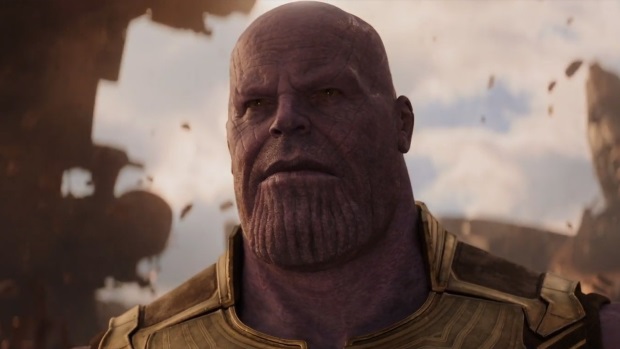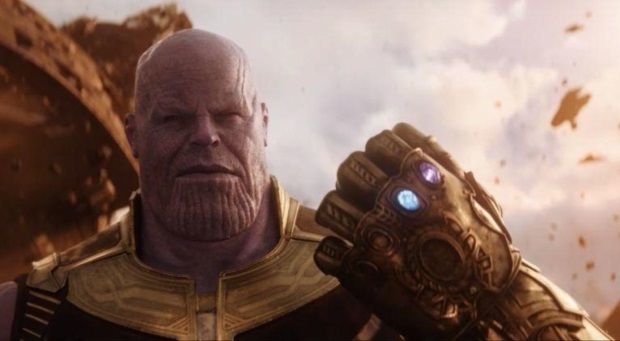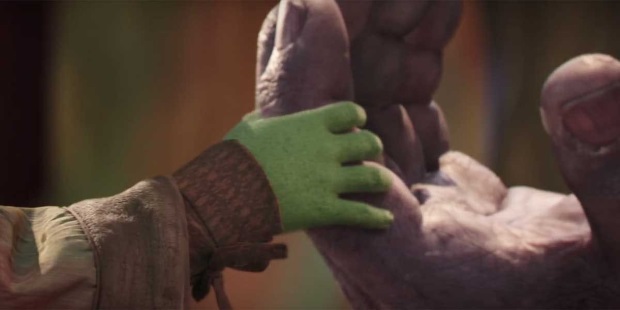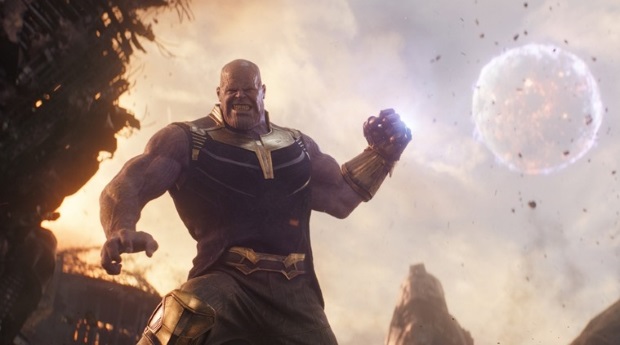Thanos: Marvel’s Most Unusual Protagonist
Avengers: Infinity War is one of the few Marvel movies with a villain of real note and impact. But he's a very unusual villain...
This article comes from Den of Geek UK.
Naturally, this feature contains massive spoilers for Avengers: Infinity War, Black Panther and Thor: Ragnarok from the outset. If you’re not fully up to date with the Marvel cinematic universe to date, catch up first, and then read this.
Until Avengers: Infinity War, we’ve only had a smattering of information about the franchise’s Big Bad, Thanos. Unless you’re a fan of the comics, or you ran straight to Wikipedia after the mid-credits scene from Avengers, we’ve had very little to go on in the six years since our first glimpse of him flashing his minion a sinister grin.
As the God of Thunder learns in the Team Thor short, we knew he was “the purple man in the floating chair.” We knew about how he wanted the Infinity Stones, which had variously popped up in other Marvel solo movies. And we knew that he wasn’t going to win any World’s Greatest Dad awards, thanks to the mad sibling rivalry between two of his foster kids in the Guardians Of The Galaxy movies.
Avengers 4 – How Will the Avengers Defeat Thanos? by denofgeek
We’re not the first to say it, but after finally watching Infinity War, it could as easily have been titled The Thanos Movie. Over two-and-a-half-hours, barely any of the dozens of other Marvel characters get enough screentime to truly be called the protagonist. There’s a lot of heavy lifting to do here, with a character whose very appearance has changed every single time he’s appeared, from stuntman Damion Poitier’s appearance in that post-credits scene, to all the various iterations of a performance-captured Josh Brolin.
And yet the film carries the load admirably. Nearly everyone who comes staggering out of Infinity War has raved about the portrayal of Thanos. Given the importance of this villain, in a franchise that is frequently slagged off for its villains, it could easily have fallen short, but the factors that make him work so well are manifold.
Even though it feels like we only just got finished talking about this with Black Panther‘s Killmonger, the film isn’t on Thanos’ side, but the overall appearance that it is might be what makes Marvel’s Mad Titan both the best villain and the most unusual protagonist in the franchise to date. And yep, this is your absolute last warning for enormous Infinity War spoilers.
New beginnings

“Your planet was on the brink of collapse. I’m the one who stopped that.”
Thanos’ objective across the grand arc of the Marvel Cinematic Universe to date is much the same as his goal in the comics. He wants to collect the six Infinity Stones that govern the core tenets of existence – Space, Reality, Power, Mind, Time, and Soul – to create a gauntlet that will make the wearer omnipotent. In The Infinity Gauntlet crossover comic event that inspired the arc, he clicks his fingers and wipes out half of all life in the universe.
What changes for the movie is Thanos’ motivation. In the comics, he’s a nihilist who falls for Death, the Marvel universe’s literal embodiment of… you get the idea. After the “to court death” line in that original cameo, and Cate Blanchett’s recent turn as goddess of death Hela in Thor: Ragnarok, you could be forgiven for thinking that’s where they were going with him. Instead, that iconic finger snap becomes movie Thanos’ objective.
Rather than impressing Lady Death, Thanos’ express goal is to save the universe by wiping out half of all life that lives in it. As opposed to nihilism, his belief system hews closely to neo-Malthusianism, which advocates population control to keep human numbers in line with the resources still available to us. It’s not practical in reality, much less conscionable, but it is surprising it doesn’t come up in films and TV more often.
Granted, this is a comic book brand of ultra-Malthusianism that’s not even galactically feasible, but it’s not a concept that comes up to often in popular media. Channel 4’s Utopia digs into it, and there have been one or two Bond villains who have close brushes with this kind of ideology in their plotting, but Infinity War really lets rip.
Thanos’ new origin story takes in the extinction of his home planet due to over-population, despite his earlier protests that genocide might be anything less than unthinkable. Exiled as his planet died, the character’s terrifying existential conviction comes from experience – while it might be clichéd to simply say that the best villains think they’re the protagonist of the movie, this movie apparently thinks that too.
Speak softly and carry a big gauntlet

“I know what it’s like to lose. To feel so desperately that you’re right, yet to fail all the same.”
Brolin doesn’t play Thanos as either a raving-mad Bond villain or some discompassionate acolyte of Utopia‘s Philip Carvel. He’s evil as shit, clearly, but his soft-spoken delivery of the wicked dialogue dreamt up by screenwriters Christopher Markus and Stephen McFeely is what makes him truly chilling. As the closest thing Infinity War has to a protagonist, of course Brolin plays him as the hero of his own story.
Even though event comic storytelling conventions seem to be in effect here, with characters whizzing around all over the shop across multiple different settings, Thanos is the common thread, to the point where it’s startling how easily the movie goes along with him. At one point, he tells Doctor Strange that after he’s done, he’ll “watch the sun rise on a grateful universe.” It sure sounds mad, but the film goes along with it for longer than you expect, and keeps going.
If we reduced Infinity War down to a simple story structure, it would belong to Thanos. He starts out in his element, destroying the Asgardian refugees, but he wants something – the rest of the Infinity Stones. He gets what he wants, paying a heavy price for it along the way, and then returns to his comfort zone, having changed. No one else in the film gets anything like as complete an arc as that, aside from maybe Thor, and that’s only because of that one amazing scene with Rocket Raccoon.
Unlike in previous instalments, there are so many of the main characters we know and love in one film, they all become supporting characters in a movie where we follow Thanos overcoming all obstacles to get what he wants. Markus and McFeely even give the villain a warped Save the Cat moment (which is when the protagonist does something nice, so we know he’s nice, in less complicated films than this one) at around the right moment, with the flashback to his adoption of Gamora. He even has a one-sided sympathy and even respect for many of the characters he beats up throughout the movie.
But as he tells his mortified foster daughter once she’s grown up, he reckons he’s the only one with the will to do what he feels is absolutely necessary. He’s a brooding hero – “burdened with glorious purpose”, to quote one of Loki’s proclamations – who is willing to hurt himself and anybody else who gets in his way to avert the imminent catastrophe that apparently only he can see coming. Even if there’s only a small chance of the future he dreads coming to pass, he must treat it as an absolute certainty.
Apropos of nothing, I’ve just remembered that Brolin was in the running to star in Batman v Superman: Dawn Of Justice. Obviously, Ben Affleck got the job, so I guess we’ll never know what his take on that sort of character might have looked like now.
Kill the Cat

“I ignored my destiny once. I cannot do that again. Ever.”
Although Infinity War‘s grim tone is countered by Marvel’s trademark humor throughout, the sickening tension of the film is in the way in which some of its most devastating moments unfold. There are no short, sharp shocks here, and even in a film that packs in as much as this does, directors Joe and Anthony Russo let us feel the dread of every major moment before it happens.
Particularly where the deaths are concerned, it’s paced more like Game Of Thrones, while keeping the actual violence in the PG-13 bracket. And so it goes when Gamora scoffs at a weeping Thanos on Vormir, because she doesn’t yet believe that he loves her enough to kill her.
The realization lasts, but in the grand scheme of things, it doesn’t take too much hesitation for him to throw her off a cliff and claim the Soul Stone. He’s such a thoroughly evil fella that his particular brand of love is utterly toxic, but it’s sincerely felt, and in the strange structure of this instalment of a sprawling multimedia franchise, you almost feel for him. Almost.
At its most basic, it’s the scene that literally counters the aforementioned Save the Cat moment, while also dramatically playing out a magical ritual of the kind that we haven’t really seen in these movies before. But nevertheless, it’s on theme with how Thanos conquers his obstacles, aka our heroes, throughout this hugely unorthodox blockbuster.
From the outset, Loki flinches away from letting Thor get killed with the Power Stone, proffering the Space Stone in exchange for his head. And back on Earth, Steve Rogers solemnly tells Vision that the Avengers “don’t trade lives,” a sentiment that’s repeated back to Cap by Vision, shortly before Scarlet Witch has to pointlessly destroy him in a last-ditch attempt to save the world.
Thanos’ sacrifice to get what he wants stands out all the more starkly, because the same tactic never works when any of the heroes try it. They just lose anyway. Meanwhile, the villain who is the villain because he wants to sacrifice half of everyone in existence, gets to put his money where his giant golden stone-spangled gauntlet is and… wins.
Finger snappin’ bad

“You should have aimed for the head.”
Up to a certain point in the movie, even if you know it’s a two-part story going in, it still looks as if everything might yet be resolved before the credits. But even after Thor mortally wounds him, the cliffhanger ending sees Thanos snap his fingers and turn half the population of the universe to dust. As some Avengers disassemble before our eyes and dread sets in, our protagonist sods off to recuperate and, sure enough, watches the sun rise on his “grateful universe”.
Fan theories abound about “how they’re going to get out of this” (“will they?” isn’t really the question with the franchise’s future secured) but those questions aren’t on our minds from the very last scene of the movie, as the villain sits and gets literally everything he wanted. Thanos realizes when he’s doing bad things, but still believes he’s the hero – he just doesn’t believe he’s a Marvel hero.
And in a Marvel movie, that’s what makes him such a terrifying foil to Marvel heroes. It makes him the ultimate villain we were promised throughout these Avengers movies, which have been primarily about heroes being friends and taking on big bullies of, um, their own making. At the end of the story, the Avengers’ utter defeat comes from a foe who negates their combined strength psychologically and ideologically.
He outpunches the Hulk, and outsmarts Iron Man, and does all of those things that a lesser CG villain could easily do. He even arrives with his own super-team of alien henchmen, drawn from the 2013 comic series Infinity and led by creepy, sassy hype man Ebony Maw, but they ultimately feel like supporting characters in his solo movie. From Brolin’s chilling mo-cap performance, to the way in which he overtakes the story from all these characters we already like, Thanos easily joins Killmonger in the top flight of Marvel’s rogues gallery, but only for a few of the same reasons.
Ultimately, Thanos is such an effective villain, his dominance in Infinity War is unfettered even by the notoriously rigid narrative conventions of a franchise 19 films deep. For a film based largely on the story of a 28-year-old comic book series, in a franchise whose safety net is woven by the metatextual ties of sequels that will apparently continue for at least another decade, the film’s bold structural departures are underlined by the very last words we see on screen – Thanos will return.